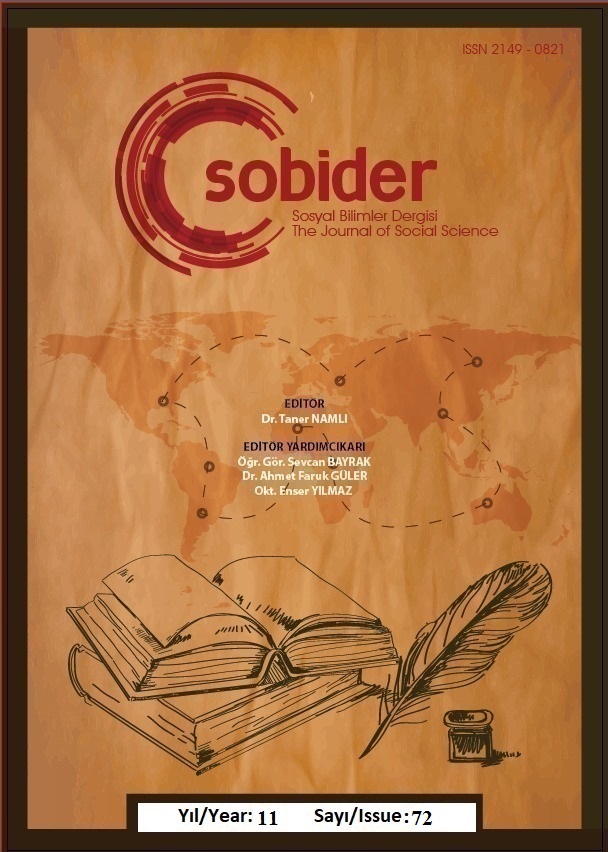Author :
Abstract
Yûsuf Sûresi’nde, Hz. Yûsuf’un kıssası, bir bütün olarak ele alınmakta ve tafsilatıyla anlatılmaktadır. Hâlbuki Kur’ân-ı Kerim’de anlatılan diğer kıssalar, farklı farklı sûrelerde birbirine eklenen pasajlar halindedir. Hz. Yûsuf’un gördüğü rüya ile başlayan ve bu rüyanın yine kendisi tarafından tabir edilmesiyle sona eren kıssası, hem tek sûrenin içerisinde, hem de baştan sona bir bütün olarak anlatılmıştır. Bu durumuyla Kur’ân-ı Kerim'deki diğer kıssalar arasında husûsî bir yeri vardır. Kur’ân, Hz. Yûsuf hâdisesini “kuyudan zindana, zindandan saraya bir yükselişin öyküsü” olarak bir nefeste eşsiz üslubuyla anlatır. Bu açıdan Yûsuf Sûresi, tâbiri caizse edebî bir roman tadındadır diyebiliriz. Aslında Yûsuf Sûresi’nde, sadece bir şahsın, yani Hz. Yûsuf’un hayatı anlatılmaz. Bunun dışında çok farklı konular da anlatılır ve ders verilir. Kıskançlık, haset, yalnızlık, gariplik, gayr-i meşrû sevgi, hırs, entrika, ihanet, dürüstlük, erdem, akıl, maharet, iyi-kötü adamlar vs. hepsi bu gerçek hayat öyküsünde tablolaştırılır. Hz. Yûsuf kıssası, bizzat Allah tarafından “Ahsenü’l-Kasas-Kıssaların En Güzeli” olarak vasfedilmiştir. Sûrenin verdiği derslerden birisi de; Kur’ân’ın tasrîf metodundan hareketle, “doğrular ve hakikatler böyle kıssalarla da anlatılabilir.” hükmüne eriştirmekte ve hakikatlere farklı bir pencere açmaktadır. Yani Hz. Yûsuf kıssası; yazılacak hikâye, roman ve senaryolar için bir örnek teşkil edebilir. Ronald B. Tobias’a göre “edebî bir eserde bulunması gereken temel kurgular” vardır. Biz makalemizde, bu temel kurguların Yûsuf Kıssası’nda olup olmadığını araştırdık ve fazlasıyla olduğunu gördük. Böylece Kur’ân-ı Kerim, dînî mesaj verirken, güzel anlatımı da ihmal etmiyor. Bu yönüyle de inananlara bir mesaj veriyor.
Keywords
Abstract
In Surah Yûsuf, the Prophet Yûsuf’s entire story is taken and explained in detail. Contrastingly, other stories narrated in the Qur’an are in the form of passages that are added to each other in different surah’s. The story of Prophet Yûsuf, begins with a significant dream he saw and ends with his own interpretation of said dream, the story is also told within a single surah yet is still completely described. In this respect, it has a special place among other stories in the Qur’an. In the Qur’an, Prophet Yûsuf tells the story of himself in one breath with his unique style as “the story of the rise from a well to a dungeon, from a dungeon to a palace”. In this respect, we can say that the Surah Yûsuf is like a literary novel, so to speak. In fact, the life of one person, Prophet Yûsuf, is not told in the Surah Yûsuf. Apart from this, many different subjects are also told and lessons are given. Touching lessons about jealousy, envy, loneliness, strangeness, illegitimate love, ambition, intrigue, betrayal, honesty, virtue, intelligence, skill, good and bad men, etc. are all depicted in this real-life story. The Story of Yûsuf has been described by Allah Himself as “Ahsan al-Qasas - The Most Beautiful of Stories”. One of the lessons given in the Surah is; Based on the Qur’an’s method of description, it leads to the conclusion that “truths and realities can also be told through such stories” and opens a different window to truths. In other words, the story of Yûsuf can be seen as an example for stories, novels and scenarios to be written. According to Ronald B. Tobias, there are “basic plots that a literary work should have”. In this article, we investigated whether these basic plots are in the Story of Yûsuf, or not, and found that there are more than enough of them. Thus, while the Qur’an gives a religious message, it does not neglect a beautiful narration. In this respect, it gives a message to all believers.





